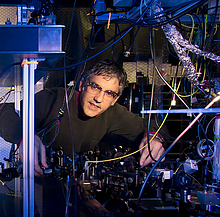Research by QuICS Fellow Monroe Featured in Nature

Research on quantum computing by Christopher Monroe, a Distinguished University Professor of physics and Fellow in the Joint Center for Quantum Information and Computer Science (QuICS), is featured in the August 4 issue of Nature.
In a paper published as the cover story, researchers working with Monroe introduced the first fully programmable and reconfigurable quantum computer module.
The new device, dubbed a module because of its potential to connect with copies of itself, takes advantage of the unique properties offered by trapped ions to run any algorithm on five quantum bits, or qubits—the fundamental unit of information in a quantum computer.
“For any computer to be useful, the user should not be required to know what’s inside,” says Monroe, who is also a Fellow in the Joint Quantum Institute. “Very few people care what their iPhone is actually doing at the physical level. Our experiment brings high-quality quantum bits up to a higher level of functionality by allowing them to be programmed and reconfigured in software.”
To learn more about this research and see a video that describes the hardware and software components of the quantum computer module, go here.
QuICS is a partnership between the University of Maryland and the National Institute of Standards and Technology. It is one of 16 labs and centers in the University of Maryland Institute for Advanced Computer Studies.
